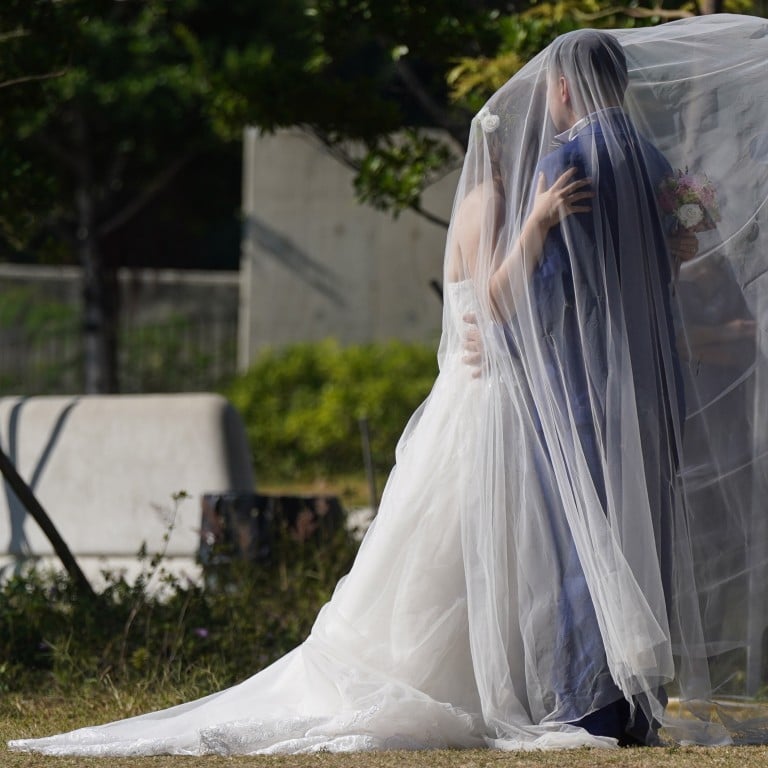
Hong Kong brides-to-be lose total of HK$1 million after sudden closure of wedding dress shop in possible case of fraud
- More than 100 future brides claim a Kwun Tong shop is uncontactable weeks after they paid for its services
- Federation of Trade Unions legislator Bill Tang says shop might have engaged in ‘bait advertising’ and urged customs to look into potential fraud
More than 100 brides-to-be in Hong Kong have lost a total of HK$1 million (US$128,000) after a shop they rented wedding dresses from abruptly shut down in a possible case of fraud, the Federation of Trade Unions legislator Bill Tang Ka-piu has said.
Some of the affected customers claimed the Kwun Tung shop had asked them to pay for services weeks before its sudden closure, but said the operators and shop assistants were now nowhere to be found.
Tang said about 110 brides-to-be had been affected by the closure and urged the Customs and Excise Department to investigate a possible case of fraud.
Losses of about HK$1 million were involved, Tang said.
Most of the customers affected by the closure said they had learned about the shop through online ads and word of mouth.
Hong Kong to ‘cut quarantine for care home residents, staff to 1 week’
Tang said: “It seems to be a case of bait advertising. The wedding dress shop might have cheated customers into paying when it knew it would not be able to deliver the services when it placed the advertisements online.”
Speaking to the press on Sunday, one of the women said she had paid over HK$32,000 to the shop in early 2020 for a dress rental and other services for her wedding ceremony which was originally scheduled for November in the same year.
She had since postponed the event several times because of the Covid-19 pandemic but was planning on having the ceremony in August this year.
“Things seemed to be going fine and every time I told them that I had my ceremony rescheduled, they said it was okay. When I visited the shop last December, it was operating normally. But when I tried to contact them again last month, I found it had shut down,” she said.
Another bride-to-be said she was asked to make a full payment of HK$2,888 in cash last November.
Hong Kong imposes toughest Covid curbs yet, new rules on family get-togethers
“Ever since, I have not heard from the staff and when I tried to contact them again for the dresses last month, I found it was closed,” she said, adding her wedding was scheduled for April.
The Consumer Council said it was highly concerned about the case and urged the shop operators to contact affected customers and explain what happened.
Bridal shops and other wedding service providers said business had been hit hard by the government’s anti-epidemic restrictions over the past two years.
Many couples had been forced to reschedule their big day due to changing social-distancing rules on group gatherings and dine-in restrictions.
Under the current restrictions, wedding or catering banquets cannot be held until February 23. Couples can only bring two witnesses to their ceremonies.
Tang asked customers to be cautious about shops insisting that customers pay with cash only. “Wedding services could easily cost HK$3,000 to HK$4,000 or even over HK$10,000. A normal business usually will accept payment by credit card.
“After all, there is a chargeback protection mechanism for credit card users and customers stand a better chance to get their money back,” Tang said.
Scammers launder HK$29 billion from victims through Hong Kong accounts
Credit card chargeback protection is a mechanism provided by international credit card associations to consumers. Generally speaking, in situations where consumers use credit cards to make lump sum payments upfront, and if the bought service is not available because the merchant has gone out of business, or the goods do not match the description, consumers can request card-issuing banks to assist in applying for refunds.
The Consumer Council received 76 complaints about wedding services in 2019. The figure went up to 233 in 2020. Last year, there were 139 such complaints.
The watchdog reminded customers to be cautious about making prepayments because the chances of getting a refund were low if a shop shut down.
The council also urged affected customers to file a report with the Customs and Excise Department, or contact the council, noting that under the Trade Descriptions Ordinance, it is an offence for a trader to accept payment if they have no intention of providing a product or service, or if they know they will not be able to give the product or service within a specified time frame.

